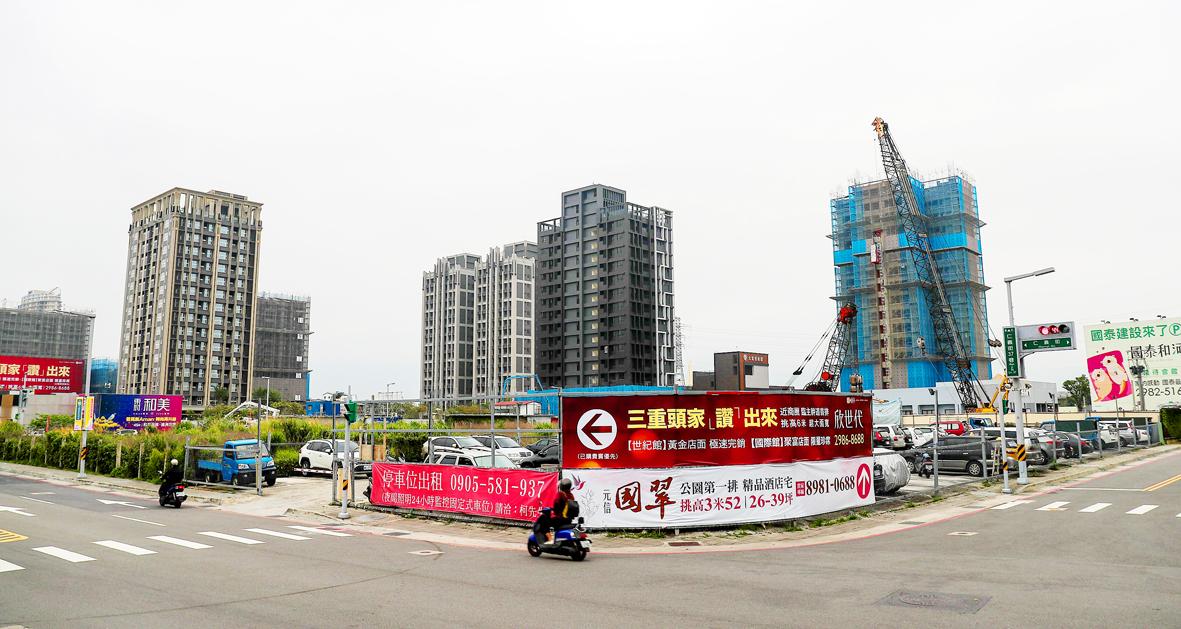The housing price index rose 1.2 percent quarterly and 3.87 percent annually to 108.17 in the fourth quarter of last year, a report released yesterday by the Ministry of the Interior showed.
Housing prices have increased quarterly for nine consecutive quarters and risen annually for 10 quarters in a row, the ministry’s data showed.
As housing prices have increased nationwide for three straight quarters, the central bank tightened lending terms in December last year and last month.

Photo: CNA
Meanwhile, the Ministry of Finance is pushing property tax revisions that would define “short-term” transactions as anything under five years, up from two years.
Under the revisions, transfers of presale projects and equities would be taxed at the same rates as properties.
Tainan reported the steepest increase in housing prices at 7.44 percent from a year earlier and 2.39 percent from a quarter earlier, the ministry said.
Property funding has flowed to Tainan in the past few years after Taiwan Semiconductor Manufacturing Co (台積電), the sole chip supplier of Apple Inc’s iPhone, made known its plans to build foundries for its newest products there.
Housing prices in Taichung increased 5.61 percent annually and 1.4 percent quarterly, the second-steepest increase in the nation, ministry data showed.
Taoyuan placed third with an annual housing price increase of 4.58 percent, followed by Kaohsiung’s 3.15 percent rise, Taipei’s 2.83 percent gain, and New Taipei City’s 2.57 percent increase, the data showed.
The ministry said that GDP growth, which hit 5.09 percent in the fourth quarter, contributed to housing price increases, while low interest rates for mortgages, which averaged 1.36 percent among the five major state-run lenders, also lent support.

‘SWASTICAR’: Tesla CEO Elon Musk’s close association with Donald Trump has prompted opponents to brand him a ‘Nazi’ and resulted in a dramatic drop in sales Demonstrators descended on Tesla Inc dealerships across the US, and in Europe and Canada on Saturday to protest company chief Elon Musk, who has amassed extraordinary power as a top adviser to US President Donald Trump. Waving signs with messages such as “Musk is stealing our money” and “Reclaim our country,” the protests largely took place peacefully following fiery episodes of vandalism on Tesla vehicles, dealerships and other facilities in recent weeks that US officials have denounced as terrorism. Hundreds rallied on Saturday outside the Tesla dealership in Manhattan. Some blasted Musk, the world’s richest man, while others demanded the shuttering of his

TIGHT-LIPPED: UMC said it had no merger plans at the moment, after Nikkei Asia reported that the firm and GlobalFoundries were considering restarting merger talks United Microelectronics Corp (UMC, 聯電), the world’s No. 4 contract chipmaker, yesterday launched a new US$5 billion 12-inch chip factory in Singapore as part of its latest effort to diversify its manufacturing footprint amid growing geopolitical risks. The new factory, adjacent to UMC’s existing Singapore fab in the Pasir Res Wafer Fab Park, is scheduled to enter volume production next year, utilizing mature 22-nanometer and 28-nanometer process technologies, UMC said in a statement. The company plans to invest US$5 billion during the first phase of the new fab, which would have an installed capacity of 30,000 12-inch wafers per month, it said. The

MULTIFACETED: A task force has analyzed possible scenarios and created responses to assist domestic industries in dealing with US tariffs, the economics minister said The Executive Yuan is tomorrow to announce countermeasures to US President Donald Trump’s planned reciprocal tariffs, although the details of the plan would not be made public until Monday next week, Minister of Economic Affairs J.W. Kuo (郭智輝) said yesterday. The Cabinet established an economic and trade task force in November last year to deal with US trade and tariff related issues, Kuo told reporters outside the legislature in Taipei. The task force has been analyzing and evaluating all kinds of scenarios to identify suitable responses and determine how best to assist domestic industries in managing the effects of Trump’s tariffs, he

Taiwan’s official purchasing managers’ index (PMI) last month rose 0.2 percentage points to 54.2, in a second consecutive month of expansion, thanks to front-loading demand intended to avoid potential US tariff hikes, the Chung-Hua Institution for Economic Research (CIER, 中華經濟研究院) said yesterday. While short-term demand appeared robust, uncertainties rose due to US President Donald Trump’s unpredictable trade policy, CIER president Lien Hsien-ming (連賢明) told a news conference in Taipei. Taiwan’s economy this year would be characterized by high-level fluctuations and the volatility would be wilder than most expect, Lien said Demand for electronics, particularly semiconductors, continues to benefit from US technology giants’ effort